Less Agony, More Ecstasy
April 12, 2016 § 11 Comments
“Your visions will become clear only when you can look into your own heart. Who looks outside, dreams; who looks inside, awakes.”
“The sole purpose of human existence is to kindle a light in the darkness of mere being.”
Tolstoy famously opened Anna Karenina with the statement that all happy families are alike, while unhappy families are unhappy in their own unique way.
I have noticed the same thing about the highs and lows of my emotional life: my unhappy states all seem to have a wide array of causes, while my happy, high, in-the-flow states all seem to sing the same tune, as it were. The same insights flash back at me like familiar road signs. An invisible river of energy seems to flow through me, carrying treasures on its back in the form of ideas, inspirations and connections.
Apparently I’m not alone. Author, speaker, researcher & founder of the “new existentialism” movement, Colin Wilson shares related thoughts in a fascinating recorded talk at San Francisco’s City Lights bookstore:
“I began by writing this book, The Outsider, which came out in 1956. My basic interest then was the problem of certain romantics of the 19th century who had experienced tremendous feelings of ecstasy & insight, and then wondered the next morning if the whole thing had been a total illusion, so that we got this tremendously high suicide rate among the romantics.”
Wilson continues:
“I became preoccupied with this because I had had the same kind of feelings ever since I was a small boy. It wasn’t until I read Wordsworth—who talks about this time in childhood when everything seems wonderful and then how, as you get older, the shades of the prison house begin to close—that I began to see this is a problem that all human beings experience.
“What I wanted to know was: is there some fundamental gap between these moods of ecstasy and the ordinary reality of the physical world in which we live? Is it totally impossible to reconcile the two of them? In a sense, you see, I couldn’t really believe that it was so. Because whenever I experienced moods of intensity or of total relaxation I always had the same insight, as if I had gone to a kind of hilltop and seen precisely the same vision, exactly the same landscape below, which made me feel that it was, in a sense, objective. It must be solid or else it would be different every time.”
“On the other hand, in what you might call ‘the worm’s eye view’ moods, things are bad in a different way every time. And you suddenly feel that it’s only the bird’s eye views that are true. It’s the big that’s true, not the small. Close-up-ness deprives us of meaning. I’ve always felt this is the basic truth of life. Somehow you’ve got to get that trick of pulling back & seeing things through a kind of wide angle lens. As soon as you do this, you go into this state of intense optimism.”
In Zen Buddhism, the high feeling-state of satori, which literally means “to understand,” is the goal of meditation practice. A brief but clear glimpse into the awakened state of satori is known as kenshō, which translates as “seeing into one’s true nature or essence.”
This is always how it feels to me when I am in the flow & feeling good: things feel like they are back on track, as they should be, aligned, harmonious. Like Wilson, I have often wondered which state is the more accurate reflection of the nature of things; both seem to negate the validity of the other.
And I’ve come to the same conclusion as Wilson, that the low mood generally lies while the high mood informs. Although a low mood tries to paint our previous high states of awareness as the purely illusory fantasies of a fool—while portraying its own staunch negativism as the only reasonable, realistic assessment—there is another clear giveaway that hints at which of these two opposing states is more to be trusted:
a low mood feels very uncomfortable, while a high mood feels very right. In fact, it is characterized by a feeling of rightness. When we tell a lie, we feel our body contract. A sense of wrongness permeates our being to various degrees. When we say something that is keenly true, we feel that too. It’s a feeling of empowerment, harmoniousness, rightness.
 “The Pleasure Principal,” by Magritte
“The Pleasure Principal,” by Magritte
In my study of this phenomenon, I have concluded that while the low mood may have something to tell me about myself or my life—revealing an uncomfortable truth that I must face in order to become who I truly want to be, (see“Navigating The Dark Night Of The Soul,”)-–there is no benefit to remaining in this place, because it becomes an energy-sapping, self-feeding loop of defeatist thinking.
Unfortunately, once we are out of step with the sensation of rightness, that high state can feel a world away. It’s helpful to remember that it is, actually, only a few flow-inducing thoughts away.
Personally, I think these two states are better described as “connected” vs. “disconnected.” Connected to what? To yourself. But how can I be disconnected from something I am? The answer can be summed up in a verse from the East Indian sacred texts, the Upanishads:
“There are two birds, two sweet friends, who dwell on the self-same tree. One eats the fruits of the tree, and the other looks on in silence.”
The bird who eats the fruit represents our worldly nature, our everyday “smaller” self. And the witnessing bird is our larger aspect (called the Atman in Vedanta, meaning soul self) which remains connected to Brahman (ultimate reality), even when the small self has lost sight of the bigger picture.
According to the Vedanta (the East Indian philosophy based on the Upanishad writings), Atman is the true self, beyond identification with phenomena, the essence of an individual. In order to attain liberation, a human being must acquire self-knowledge, which is to realize that one’s true self (Atman) is identical with the transcendent self (Brahman). (Traditionally achieved through meditation, wherein the distinction between these two selves becomes increasingly evident.)
I’m not one to care about religious dogma or what some ancient text says—unless it puts a language to experiences I have had myself already, for which we have poor working vocabulary in English language & culture.
I do think the Vedanta framework establishes a helpful concept of what is going on when we feel low, which, by my way of thinking, is essentially a state of disconnection, when we are overly identified with the “small self.”
When we are connected to our essence or greater self (which is connected to the broader sweep of larger reality), it seems we receive intuition freely, we are in sync with the rhythm of life and other people. We receive inspiration more easily, which in turn lights us up and “turns us on,” fueling our sense of optimism, curiosity & movement.
Our world seems to expand. We notice subtle “shimmers”—little beautiful moments that add to the textured richness of being alive. When we are open to these nuances, we become more easily inspired and interested. Which creates a sense of possibility & engagement.
When we are disconnected, our world seems to shrink. It is like we have run out of gas. We feel sluggish and everything takes a lot of effort to do. This induces a feeling of depression and futility, which feeds upon itself until we can feel quite locked away from that “Atman” self.
In this emotional state we seem to forget all of the insights which once gave us a sense of hope and possibility. We are entirely identified with the “bird who eats the fruits” of the world, and completely dissociated from the “sweet friend” who looks on, waiting patiently to be remembered & reclaimed.
Colin Wilson dubbed this “small self” aspect of human personality “the robot.” He elaborates in the following interview:
“We have inside us what I call The Robot, a sort of mechanical valet or servant who does things for you. So, you learn something like talking French, or driving a car, or skiing—painfully & consciously, step by step. Then the Robot takes over and does it far more efficiently than you could do it consciously.
“The Robot does all these valuable things—like talking French & so on for us. The trouble is, he also does the things we do not want him to do. We listen to a piece of music, it moves us deeply the first time. We read a poem, we go for a country walk, and it moves us. But the second or third time you do it, the Robot is listening to the piece of music, or going for the country walk for you. I’ve even caught him making love to my wife! This is a real problem, that the Robot keeps taking us over and doing the things that we would rather do.”
“The secret is to keep your energy so high that [you avoid being taken over by] the robot, who’s a bit like the thermostat on the wall, which turns on quite automatically when your energies drop below a certain point, and then suddenly without even noticing it, you’re living mechanically, robotically, instead of as the real you. And the interesting thing is that it’s only a matter of one degree. Therefore if it’s just one degree to turn onto the Robot, it’s only one degree of effort to turn the Robot off.”
I have found that simply being aware of this dynamic initiates a ripple effect of more expansive feelings. Think of it as a thought experiment. I’m not advocating the removal of cynicism or discernment, only for the suspension of its mechanisms for long enough to collect the necessary data to really decide what’s what. If we decide something sounds too good to be true before launching a thorough investigation, we aren’t really giving ourselves all of the information necessary to make an assessment.
Just imagine, what if it were true that our sense of an isolated small self is not the whole picture, and, when we feel into a larger, more expansive & connected being-hood we are actually more fully embodying who we are? What if that self did have wisdom beyond our acquired knowledge & access to universal perception?
And what if there was a force of energetic support available to us, waiting for us to tune into a more expanded sense of self? What if the darkness & pain of the world is simply the result of a widespread belief in the smaller, isolated self—a collective disconnection from the expanded essence?
 “Soul Ascending” by Josh Hutchison
“Soul Ascending” by Josh Hutchison
The only way to know for sure…is to explore it.
Unless we investigate the possibilities within ourselves & our relationship to reality with an open mind, we may never experience ourselves as we might become.


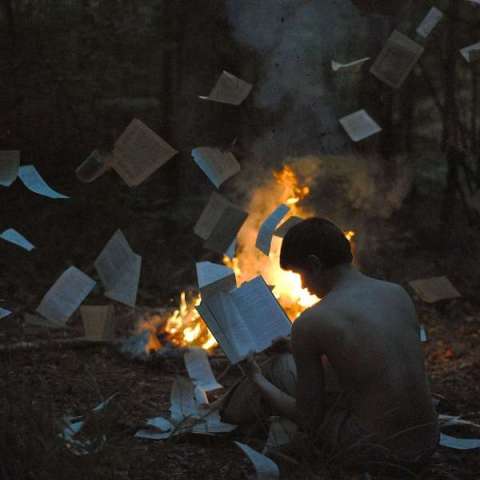



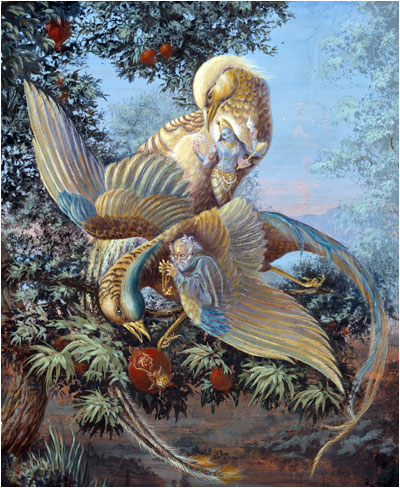


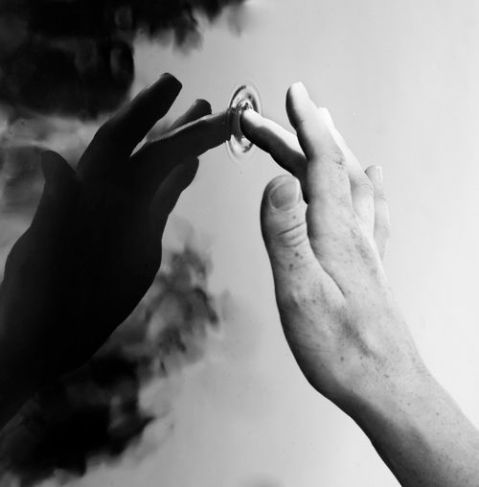
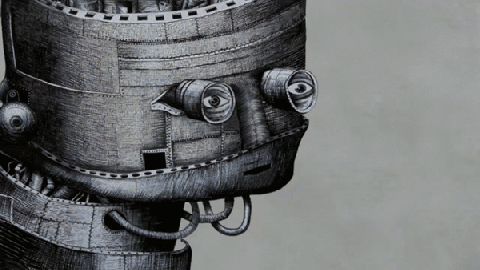
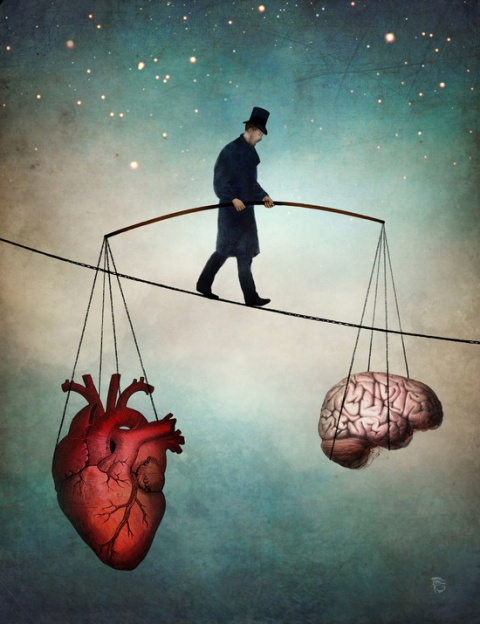

“What if it were true that our sense of an isolated small self is not the whole picture, and, when we feel into a larger, more expansive & connected being-hood we are actually more fully embodying who we are? …What if the darkness & pain of the world is simply the result of a widespread belief in the smaller, isolated self—a collective disconnection from the expanded essence?”
A wise, encouraging conclusion.
Thank you again!
I’m so glad to hear it, Alan. Thanks for the thoughtful comment. It really feeds my fire to know the posts are hitting home with people. That’s why I do it! With that hope. 🙂
On on,
TCW
Carl Jung said “There is no coming to consciousness without pain. People will do anything, no matter what, no matter how absurd, to avoid facing their own soul. One does not become enlightened by imaging figures of light, but by making the darkness conscious”.
In his Jung’s book the “The Answer to Job” he explains how we must suffer God. That we through our own evolving process also bring God into an evolving process. That God requires nature to experience and that nature is presence, immediacy and holds no meaning, but just is. Suffering is the key to redemption and opening us to a direct doorway to truth of both what we are and what we are not. Opening both your heart and soul and finding peace with suffering is allowing acceptance beyond this existence. This allows us to flow in the center between spirit and life. It is difficult calling, as the Job story tells how to suffer God, but one that cannot be avoided and it allows us to “See” the greater meaning around us…
I love that Jung quote, Kristen. Big Jung fan, here! I definitely agree that part of our journey is to pass through the rites of initiation that are usually marked by struggle….there is no way around, only through. We have to face our dragons to get to our gold.
Thanks for your thoughtful offerings here!
Did you get the New Year’s raffle package I sent, since I pulled your name out of the January comments raffle? 🙂 Hope so! Let me know…!
On on,
TCW
Yes and how wonderful your gift that I use on my ritual table. I love your inspiring site and thank you for the gift. They are beautiful and came at time needed. Jung changed my life and help me find a very deep relationship both to myself and to life. How wonderful the time we live to have so much to help us open.
Keep lighting the middle path,
Kristine
Oh good! I just get paranoid about the post office losing stuff. I know it’s silly!
So glad to hear it reached you at the right time. I know it was a few months after the raffle, but I *hoped* it would ride the wave of some serendipitous timing for you. So glad to hear it did!
Thank you for your kind words, Kristen! They mean a lot. 🙂
Jung is definitely my number one hero. He says everything we have felt and more! I think he is the most profoundly wise & connected of anyone. You are right, we are lucky to live in a time where we can access so many notes left by the great souls who came before.
On on,
TCW
This came just when I needed it, thank you.
Coincidentally, I recently discovered Colin Wilson and started reading ‘The Outsider’.
Ivor
I’m so glad to hear it, Ivor. That is always my hope! I try to tune in. 😉 Thank you for letting me know!
Isn’t Colin Wilson great? Love that book! What a fun serendipity. I think serendipitous & Colin Wilson definitely go hand in hand.
On on,
TCW
I am so thankful that that “hilltop” that Wilson describes always shows the exact same vision of the bigger picture. The more we do this awakening thing, the more we trust ourselves once we return to the “worm’s eye view” to remember what we’d seen on the hilltop and that it does, in fact, exist. The further we go into bliss, the more painful falling back to the minimal view feels, until we simply have had enough of the lows which we have fallen to previously and learn how to avoid falling that low again. It seems sometimes like it takes a thousand trips before I finally get enough. 🙂
Once it becomes easy to recognise when we are disconnected, as you so aptly put it, reconnecting feels so essential and disconnecting feels like failure. So hard to remember that every step is necessary, hard to remember that every step is sacred. The Robot can take control even as we believe ourselves to be aware of it. To find beauty in the disconnection, to cherish the Robot, to smile at it, nod, remove its hand from our shoulder and head in the direction we choose, is a moment~by~moment process. So honoured to be doing it. Always helps being reminded. Thank you, as always, Sister.
Beautifully expressed, 64doors,
“The further we go into bliss, the more painful falling back to the minimal view feels, until we simply have had enough of the lows…”
And it’s true, too, that we must find beauty in even the robot and the lows. Then choose our direction anew.
Thanks for being part of the conversation! 🙂
On on,
TCW
Wonderful, i just wish that Colin Wilson talk at the City Lights bookstore was still online. It’s gone for now.
Nevertheless, thank you for the great excerpts from his San Fran session. Its wonderful to hear a bit of truth (however blatant it should be to us) put into new words to shake up our cognition now and again. . . to “shock the (robot) monkey” as Peter Gabriel might say!
Yes, gotta get out of our monkey-mind and into the meta-moment mind!
[Random handstands, sporadic cartwheels, and making very intentional non-sense of a regular routine are very invigorating, by the way)